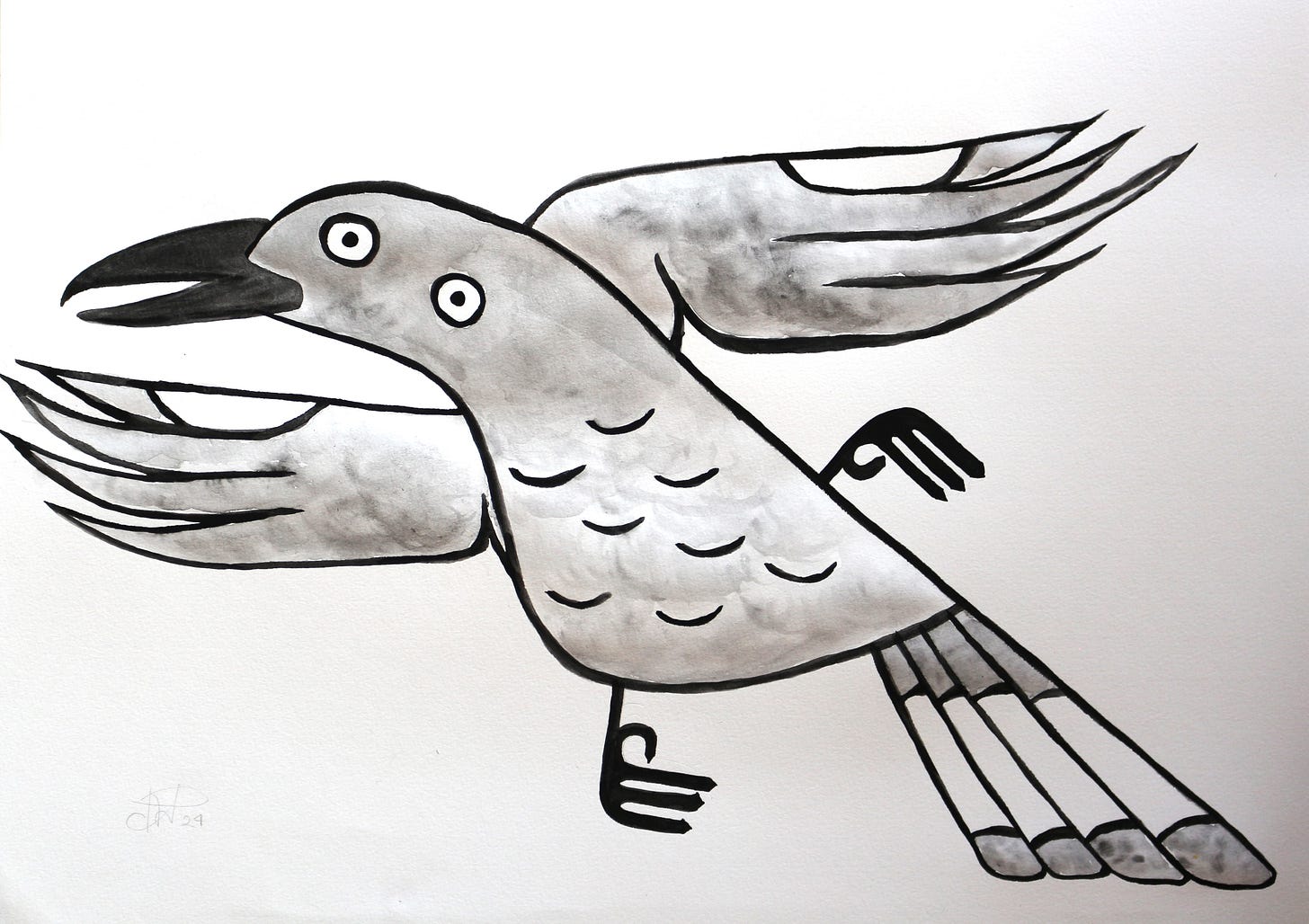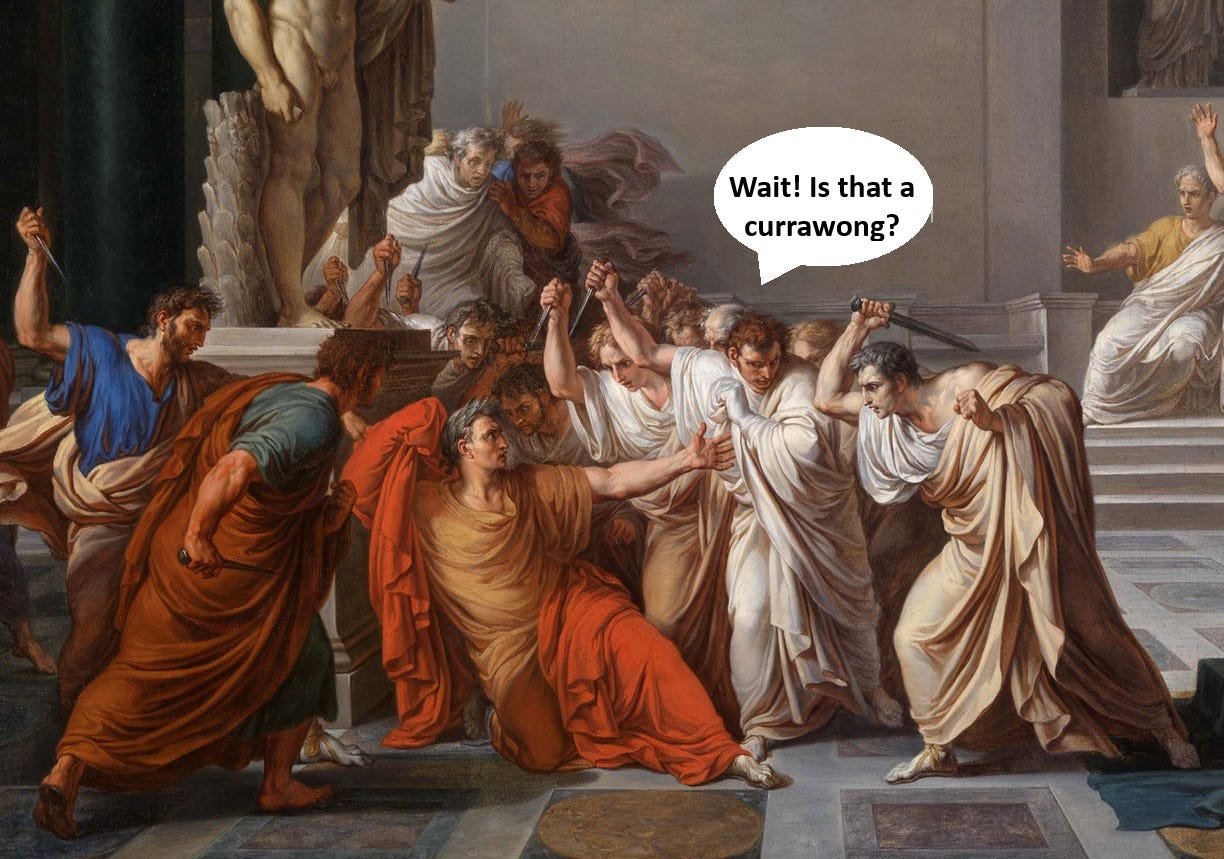Flexible memories
#03 – And how they affect memoirs
Welcome to Mind Flexing, your weekly thought expedition to everywhere and anywhere. Strap on your boots (or put your feet up), take a deep breath, and let’s get flexing.
The currawong calls and silences my thoughts. I stop as I have ten thousand times before, charmed, beckoned back to the present. My shoulders, stiffened by days that hurtle through time, melt off the bone and drip down my arms and my lungs to slow my breath. The currawong calls and I listen. I always listen.
And then I’m back, lying in my cot beneath the window watching morning’s golden light dance through the sheer curtains. Its radiance warms my tiny body; its blinding flicker is hypnotic. And the currawong is calling. Its call is answered by another, and then another. And I listen.
The sound of the pied currawong in the golden light of morning is my earliest memory and one that continues to elicit a soothing primordial comfort whenever I hear its onomatopoeic song. It’s a memory that I’ve recalled countless times; so many times that is has become problematic: I’m not sure it can be trusted. Neuroscientists have shown that the brain has a habit of recreating memories from remnant traces, filling in the gaps to make sense of the missing, adapting details to new environments, and evolving to suit our biases. Memories change.
It begs the question, if memory is flexible, how can we ever be certain we remember the truth? Are we unreliable narrators of our own lives?
With memoirs and biographies often topping the best-seller lists and more authors than ever interested in writing the genre, should we trust that the author’s truth is truthful?
The currawong calls now as I write, and I pause. I’m floating, out of body, and looking down I see a room, all yellow, empty but for a cream cot and a baby tucked in a yellow crocheted blanket beneath a white window frame with sheer cream curtains that blow in the spring breeze. Outside in the bush reserve’s dense canopy, the currawongs call to each other from their tree limbs, and they call to the baby, their song echoing through the still morning to vibrate within her chest. She is 18 months old, and she is happy.
That my earliest memory is filled with sunlight and the song of the currawong, I’ve no doubt. The heartfelt reaction I experience to this sound reassures me of that. It’s also likely that this memory earned its place in my infant brain by its frequent recurrence. If I were to ask my mother, I suspect she would say I wasn’t raised in a near empty room of yellow and cream. Later memories and photos place the yellow crocheted blanket, and I recall being told some two decades later of the bushland reserve outside the window of my first home, from which we moved before I turned two. Each new piece of information has become a part of this memory in an atomic fusion.
Are you sure?
Memories often change because the brain needs to reconstruct them from bits of stored information every time they are recalled, Associate Professor Helen Paterson, a senior lecturer in Forensic Psychology at the University of Sydney, told Sydney Alumni Magazine. The brain takes what bits it can find, often spread all over the place, and attempts to make them coherent. Interestingly, recurring events were most likely to be misremembered because they become harder to differentiate over time.
Concerningly, the article noted that one of Paterson’s students, recent Forensic Psychology PhD graduate Sarah Deck, found that people who had experienced repeated events, such as victims of domestic or workplace abuse, were rated as being less credible witnesses than actual liars and those experiencing a single event because when cross-examined, their memories were often muddled.
The article’s author, Cassandra Hill, wrote:
“The findings are interesting for what they imply: we might assume that people telling the truth will give detailed, specific information about what they experienced, when the opposite is often true.”
Further complicating things are ‘memory illusions’, which Dr Marte Otten, assistant professor at the Brain and Cognition department of the University of Amsterdam, said are instances of remembering things incorrectly based on our expectations.
Writers will be familiar with this one as our eyes have all stared directly at typos and spelling mistakes in our work and failed to recognise them, especially when the words are fresh from our fingers. Our expectation of what the line should say frequently overrides the letters on the page (which is why we all know it’s wise to let our words rest before publishing them).
“Even at the shortest term, our memory might not be fully reliable. Particularly when we have strong expectations about how the world should be, when our memory starts fading a little bit – even after one and a half seconds, two seconds, three seconds – then we start filling in based on our expectations.”
But hark! The currawong calls again, and I pause to go back. The sheer cream curtains brush my face as I push through to lean out my window. Golden light bursts blindingly through the trees of the bush reserve, illuminating the world with a shimmer that warms my limbs. And there it is. The currawong calls to me and its song resonates within my chest and I reach my tiny fingers out from under my yellow crocheted blanket towards its streamlined body and it jumps between branches as it looks at me, and I am happy. The currawong calls, and I listen. I always listen.
The importance of forgetting
Our earliest memories are often the sketchiest, not only because we repeatedly recreate the event from traces of information in our minds, but also because our brains are programmed to forget – sometimes years later, sometimes instantly.
Believe it or not, forgetting is an important part of memory. By removing unessential information – like the colour socks the person three places ahead of you in the supermarket queue was wearing two weeks ago – the brain can operate more efficiently. Paul Frankland of the Josselyn Frankland Neurobiology Lab in Toronto told Time Magazine that the brain’s ability to forget allows it to reconfigure memories to favour more recent and useful information; information that is likely to be more important to the future and for survival.
Interestingly, Frankland said the institute’s research in mice had found that the faster new neurons formed in the brain’s hippocampus, the less likely the mouse was to recall older memories. Frankland theorised that this could explain why we have so few memories from early infancy, a time of exponential neural development.
So our brains automatically clean out the cabinets to make space for new memories, and this combined with the recreation of old thoughts leads to misremembering – skewed truths. But what if, in addition to that, we also forget things that we never knew we knew? That our version of events was never complete to begin with?
Now, I’m sure some of you are thinking, ‘OK, interesting, but I’ve got a pretty good memory. Not concerned in the slightest.’ So, before I go on, there’s something I need you all to do – a little experiment.
(A quick thank you to Rob Walker of The Art of Noticing for bringing this one to my attention in his post on Noticing Illusions.)
Please watch these two very short videos before reading any further (if you’ve seen them before, have another crack) and I’ll meet you again when you scroll down.
The Selective Attention Test
The Monkey Business Illusion
Ha! How’d you go? What you just experienced is something called Inattentional Blindness. It’s a term coined by psychologists Arien Mack and Irvin Rock in their 1992 book Inattentional Blindness to describe the failure to perceive unexpected stimulus occurring in plain sight.
The Selective Attention Test video produced by psychologists Chris Chabris and Dan Simons in 1999 allowed us to notice our own inattentional blindness, and it became so well known that Simons produced a second, slightly different video called the Monkey Business Illusion in 2010.
There are several theories about what causes inattentional blindness. The two I find most interesting are the Perceptual Load theory and the Inattentional Amnesia theory.
Perceptual load
Simply put, this theory states that a complex stimulus requires more attention, and as we focus on it, we exhaust our brain’s available resources causing us to miss other non-target stimuli in the field of vision. Conversely, we are more likely to perceive non-target stimuli when the stimulus we are focused on is less complex.
Inattentional Amnesia
This theory suggests inattentional blindness is a failure in memory. It hypothesises that our brains consciously perceive the non-target stimuli in a visual field but, deeming them unnecessary, forget them so rapidly that you would never know you knew.
Either way, the result is the same: in a complex world where many things occur simultaneously, we are only likely to perceive a fraction of what’s truly happening around us. The fragments we perceive to be important are stored in our minds, some traces disappearing, some evolving, and other memory illusions being created.
With that in mind, it was interesting to read an extract from Robyn Davidson’s recent memoir Unfinished Woman, where Davidson – most famously known for her 1980 novel Tracks – struggles with her reliability as the narrator of her own life, especially concerning her memories of her mother’s suicide when she was 11 years old. She says:
“But I now know that memory is shot through and through with falsehood; that published words are powerful, and while one has a responsibility to try to get at the truth, one has also to remember that one person’s version of it can bury another’s.
My sister’s take on my mother’s story is so different from mine that it is as if we emerged from different wombs.”

It’s a wonderfully honest analysis of the challenges faced in writing a truthful memoir. Davidson is conscious that her truth differs significantly to that which her sister believes to be true. They are both truths in the sense that neither sister is lying – they are recalling their honest memories. But neither is universally true, and the existence of inattentional blindness suggests the ultimate truth of any scenario can never be known. Even video recordings fail to capture every dimension of a moment in time, especially those that can’t be seen, like thoughts.
According to Nielsen BookScan Australia data published in The Sydney Morning Herald, memoir sales have more than doubled in the past 20 years, rising from 833,000 books in the category in 2003 to two million in 2022.
Given the popularity of memoirs, understanding how memories form and change can give us a broader perspective of the genre. Authors remain the most reliable source of information about their lives despite being unreliable narrators.
If there’s anything to be learned here, it’s to journal, and I’m sure many of you do. Write it all down to remind yourself of the truth, that is, the parts of the truth you didn’t miss. I regrettably have never taken to the habit and therefore, if there’s anything else you should take from this, it’s to place little faith in my recollections.
Ahh, but there it is again… the currawong calls and I am back there, perched in the trees, flickering in a golden light that evades the leaves of the canopy, my crocheted blanket draped over my tiny shoulders like yellow wings. The currawong’s streamlined body, darker than the night, darts stealthily from branch to branch, its yellow eye locking onto mine with hypnotic intensity. It calls, and others join in the chorus, flocking around me and filling every inch of my being with their song. The currawong calls, and from that branch, I listen. I always listen.
Thank you for Mind Flexing with me. If you enjoyed this essay, please subscribe, comment below, show some ❤️, or help me get this new publication off the ground by sharing it with someone you think would appreciate it.
I’ll be back next week. Until then, keep 💪.





Another thought-provoking article, Alia. My thoughts have been moving along similar paths recently, particularly from the unreliable narrator perspective.
Absolutely loved this. Very very insightful- thank you for sharing